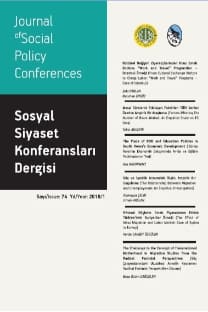BİLGİ TOPLUMU ve BİLGİ İŞÇİSİ BAĞLAMINDA ÇAĞRI MERKEZLERİ: EMEK SÜRECİ, İŞ ve İSTİHDAM
Bilgi ve iletişim teknolojilerindeki gelişmeler, 20. yüzyılın son çeyreğinde mikroelektronik alanındaki yeniliklerle birlikte hız kazanmıştır. Yeni bir toplumsal modelin, çalışma türünün ve işçi tipinin ortaya çıktığı yönündeki görüşler de, bu değişimlere eşlik etmektedir. Bu çalışma, bilgi toplumu varsayımları ile ilgili olarak ileri sürülen yeni çalışma türü ve işçi tartışmalarını, Türkiye'deki bankaların çağrı merkezlerinde test etmeyi amaçlamaktadır. Bilgi işi ve yüksek ücretli, yüksek vasıflı bilgi işçilerinin ortaya çıktığı iddialarına karşın; elde edilen bulgular, emek süreci, iş ve istihdamın fordist-taylorist iş organizasyonunun temel prensiplerini içerdiğini göstermektedir.
Anahtar Kelimeler:
BİLGİ TOPLUMU, BİLGİ İŞÇİSİ, EMEK SÜRECİ
BİLGİ TOPLUMU ve BİLGİ İŞÇİSİ BAĞLAMINDA ÇAĞRI MERKEZLERİ: EMEK SÜRECİ, İŞ ve İSTİHDAM
The advancements in information and commımication technologies have accelerated in the final quarter of 20th century along with innovations in microelectronics. An associated development was that a new model of society and a new type of work and worker were emerging. This study intends to test the arguments about the emergence of new type of work and workers associated with the information society thesis in the context of call centers in private banks in Turkey. It seeks to demonstrate that despite the claims about the emergence of information work and knowledge workers with high wages and skill, labor process, work and employment are designed in line with the principles of Fordist-Taylorist work organizations.
Keywords:
The advancement, Fordist-Taylorist, commımication technologies,
___
- Bell, Daniel. The Coming of Post-Industrial Society: a Venture in Social Forecasting. USA: Basic Books, 1973.
- Beutert, S. ve K. Hess. "Call Centre: Realität und Vision"; in ComputerFachwissen. Nr.3: 2-3,1999.
- Bibby, Andrew. "Organising in Financial Call Cenres", a Report for UNI, Discussion Paper, March 2000.
- Brown, G. ve G. Maxwell. "Customer Service in UK Call Centres: Organisational Perspectives and Employee Perceptions", journal of Retailing and Consumer Services. Vol.9, No.6: 309-316, 2002.
- Dean, Alison M. and A l Rainnie. "Absenteeism From The Frontline: Explaining Employee Stress and Withdrawal in a Call Centre", MONAS H University, Business and Economics, Working Paper- Vol:71, No.4: 1-14, 2004.
- Dodson, S. "a Riot from Cyber Space", The Guardian:16-17. 24 Junel999. Drucker, Peter F. Kapitalist Ötesi Toplum. Belkıs Çorakçı (çev.). İstanbul: İnkılap Kitabevi, 1993.
- Erdem, Ziya. Tele Çalışma. Filiz Kitabevi, İstanbul, 1998. Gilmore, A. "Call Centre Management: Is Service Quality a Priority?", Managing Service Quality. Vol.11, No.3: 153-159, 2001.
- Gilmore, A. ve L. Moreland. "Call Centres: How Can Service Quality Be Managed?, Irish Marketing Review. Vol.13, No.l: 3-12,2000.
- Grebner, Simone, K. Semmer Norbert, Luca Lo Faso, Stephan Gud, Wolfgang Kälin, and Achim Elfering. "Working Conditions, Well-being, and Jobrelated Attitudes Among Call Centre Agents", European Journal of Work and Organizational Psychology. Switzerland: University of Berne, 2003: 341-365.
- Greenbaum, J. "The Times They are A Changing: Dividing and Recombining Labour Through Computer Systems", Workplaces of the Future. P. Thompson, Ch. Warhurst (eds.). London: MacMillan, Houndsmills, 1998.
- Gültan, Seçkin. Bilgi Toplumu Sürecinde Avrupa Birliği ve Türkiye. Ankara: Ankara Üniversitesi Avrupa Toplulukları Araştırma ve Uygulama Merkezi, Araştırma Dizisi No:19, 2003-
- Isic, Amela, Christian Dormann ve Dieter Zapf. "Belastungen und Ressourcen an Call Center-Arbeitsplätzen", (Job Stressors and Resources Among Call Center Employees). Work and Organizational Psychology. Frankfurt University, Zeitschrift für Arbeits Wissenschaft. No.53: 202-208, 1999.
- Katz, J. E. "Empirical and Theoretical Dimensions of Obscene Phone Calls to Women in the United States", Human Communication Research, Vol.21: 155-182,1994,
- Kohen, Alp. "Çağrı Merkezleri: Yararları ve Bileşenleri", 2002. http://www.tekadres.com/tekadres/content/mm4_sm3_14.htm (20 Nisan 2005)
- Korczynski, M. "The Contradictions of Service Work: Call Centre as CustomerOriented Bureaucracy", in Customer Service Empowerment and Entrapment A- Sturdy, L Grugulis and H . Wilimott (eds.). Basingstoke, Hampshire: Palgrave, 2001: 79-101,
- Lyon, David- "The Roots of the Information Society Idea", Information Technology and Society- Nick Heap, Ray Thomas, Geoff Einon, Robin Mason and Hughie Mackay (eds.). Great Britain, 1995: 54-70. Masuda, Y. Managing in the Information Society. Cambridge: Basil, Blackwall, 1990.
- Mirchandani, Kiran. "Practices of Global Capital: Gaps, Cracks and Ironies in Transnational Call Centres in India". Global Networks. 4: 355-373,2004.
- Morrell, Steve and Christine Sprigg. "U K Call Centres Outperform India", The Customer Management Community. 2004. http://www-insightexec.com/cgi-bin/item.cgi?id=l 30247 (20 Şubat 2005).
- Parker, S. ve T. Wall, "Job and Work Design: Organizing Work to Promote Weil-Being and Effectiveness", Thousand Oaks . CA : Sage, 1998.
- Parolle, J. A. "Intellectual Assembly Lines: The Rationalization of Managerial, Professional, and Technical Work". Computerization and Controversy: Value Conflicts and Social Choice. C . Dunlop and R. Kling (eds.). San Diego: Academic Press, 1991.
- Savitch, H- V. Post Industrial Cities: Politics and Planning in New York. London: Princeton University Press. 1988.
- Tapscott, Don. The Digital Economy. Mcgraw-Hill, 1996. Taylor, S. ve M. Tyler. "Emotional Labour and Sexual Difference in the Airline Industry", Work, Employment & Society. Vol.14, No.l: 77-95, 2000,
- Toffler, Alvin. Üçüncü Dalga. 3. Basım. Ali Seden (çev.). İstanbul: Altın Kitaplar Yayınevi, 1996.
- Wallace, C . M., G. Eagleson, ve R. Waldersee. "The Sacrificial H R Strategy in Call Centres", International Journal of Service Industry Management Vol.ll,No-2:174-184,2000.
- Zuboff, Shoshana. In the Age of the Smart Machine: The Future of Work and Power. Harper Collins Publishers, Basic Books. New York. 1988.
- ISSN: 1304-0103
- Yayın Aralığı: Yılda 2 Sayı
- Başlangıç: 1948
- Yayıncı: İstanbul Üniversitesi Yayınevi
Sayıdaki Diğer Makaleler
KADIKÖY’ÜN NÜFUS ve EĞİTİM YAPISI (Türkiye ve İstanbul Karşılaştırmalı)
BİLGİ ŞİRKETLERİNDE ÇALIŞANLARIN DEĞİŞEN VASIF PROFİLİ VE UNILEVER (TÜRKİYE) ÖRNEĞİ
SELÇUKLU VE OSMANLI ANADOLU'SUNDA AHİLİĞİN SOSYO-EKONOMİK GELİŞİM SÜRECİ
İ.Ü. İktisat Fakültesi Çalışma Ekonomisi ve Endüstri İlişkileri Bölümünün Tarihçesi ve Gelişimi
Korunmaya Muhtaç Çocuklara Yönelik Özel Bir Proje: Vakıf Evleri
Uluslararası Rekabet Karşısında Türk İşletmelerinin Durumu ve Girişimcilik
TÜRKİYE’DE İÇ GÖÇE KATILANLARIN KENT YAŞAMINA ve KENTSEL EMEK PİYASALARINA ETKİLERİ
İnsan Kaynakları Yönetimi Boyutuyla Kurumsal Sosyal Sorumluluk: (Bir Alan Araştırması)
